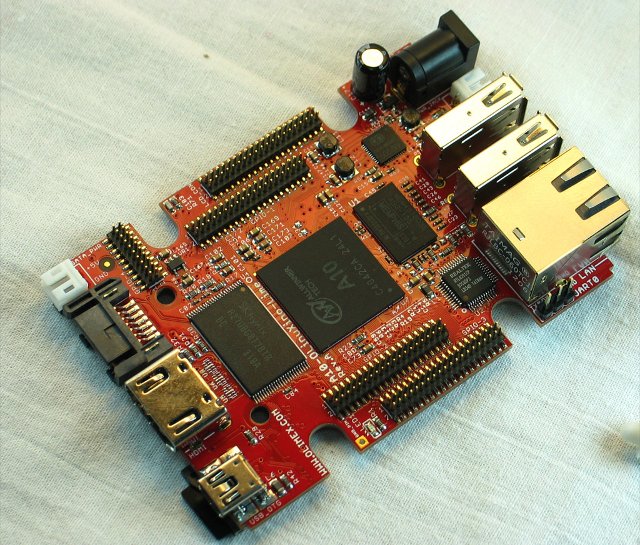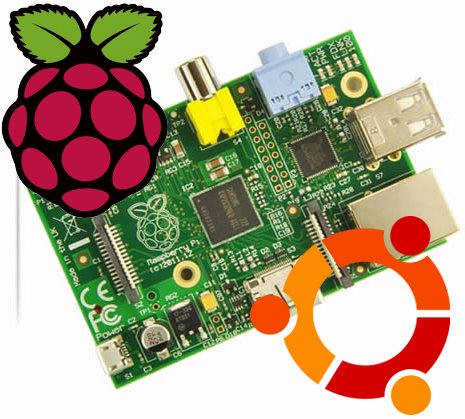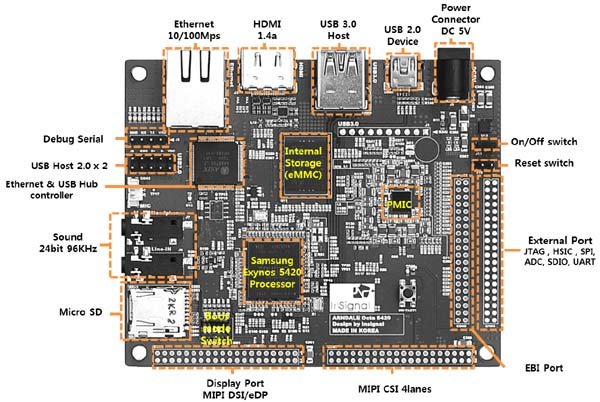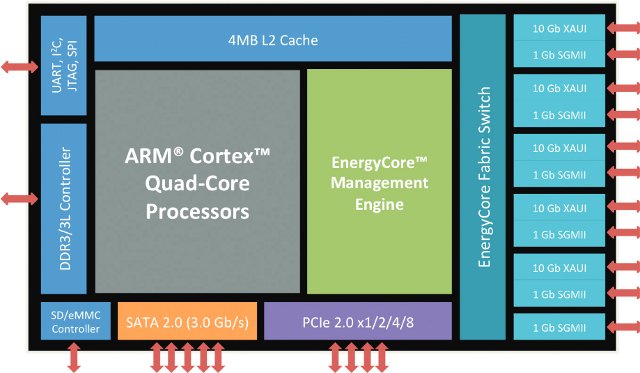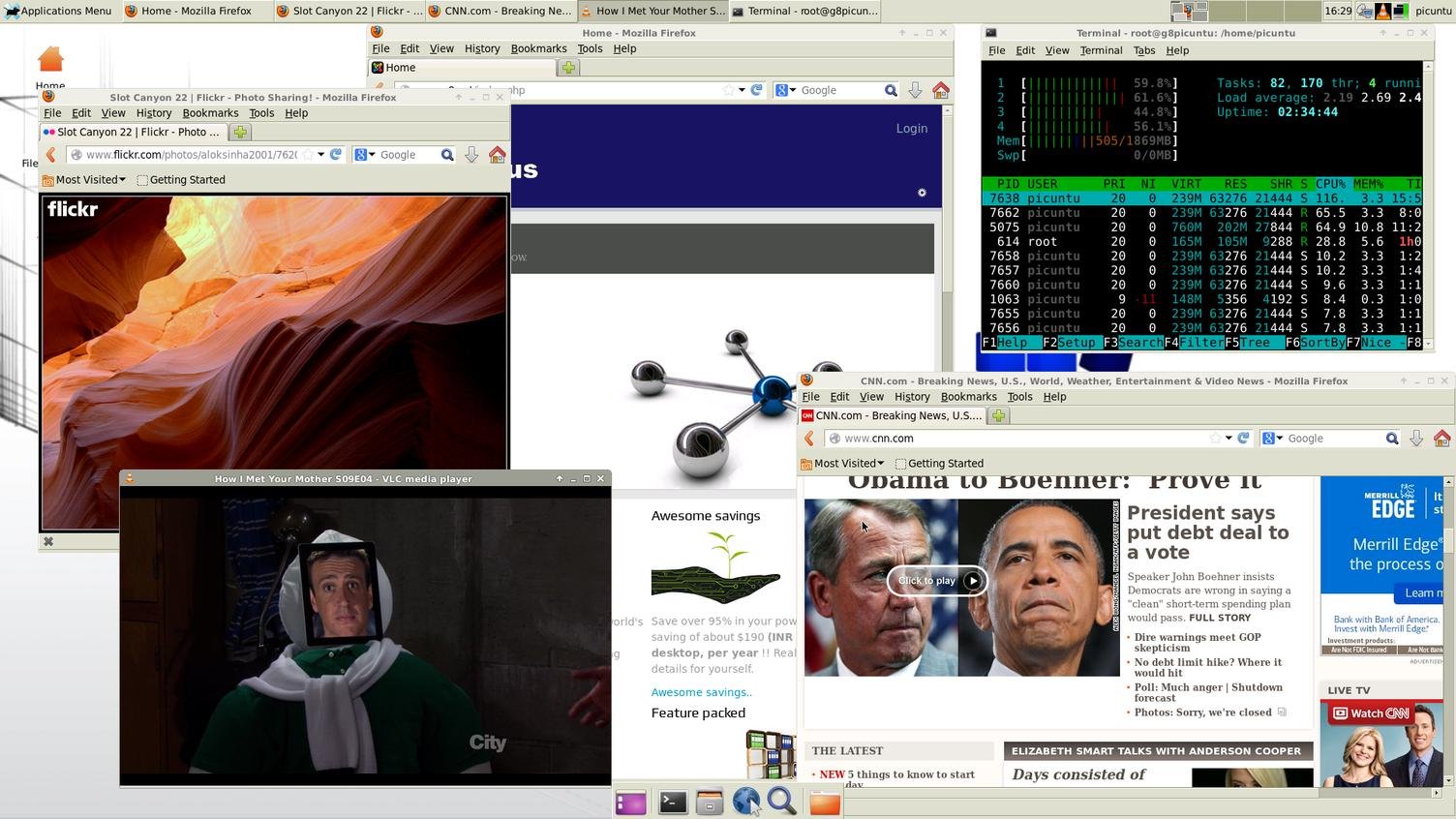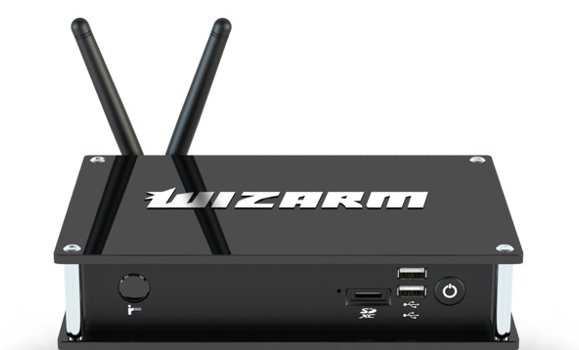The Raspberry Pi, Beaglebone Black and Cubieboard are probably the best selling ARM Linux boards in the sub $50 category, but they’ll soon be joined by Olimex A10-OLinuXino-LIME powered by AllWinner A10 ARM Cortex A8 SoC with 512MB RAM that will sell for 30 Euros (About $40) when it becomes available in December. Another version of the board based on AllWinner A20 dual core Cortex A7 SoC, called A20-OLinuXino-LIME will also be sold, adding Gigabit Ethernet, and scheduled for Q1 2014. Pricing has yet to be disclosed for the A20 version. A10-OLinuXino-LIME specifications: SoC – AllWinner A10 ARM Cortex-A8 @ 1GHz with Mali-400 GPU System Memory – 512MB DDR3 Storage – microSD card slot, SATA, and optional 4GB NAND Flash Video Output – HDMI 1080p USB – USB-OTG + 2x USB Hosts Connectivity – 10/100Mbit Ethernet Expansions – 200 GPIOs on 0.05″ connectors Misc – Lipo battery management and connector, […]
Linaro 13.10 Release with Linux Kernel 3.12 and Android 4.3
Linaro has just posted a blog entry to announced Linaro 13.10 was available for download. This is normally supposed to occur on the last Thursday of the month, but it’s possible the release occurred on scheduled, and the blog post was late, or it may have been delayed because of Linaro Connect US 2013. You can access a summary of the event together with slides and videos of the sessions and keynotes when available. This release includes the Linux Kernel 3.12-rc5 (staging), Kernel 3.10.14 (LSK), Android 4.3.1, and Ubuntu Linaro 13.10 (still based on Raring). Android has been ported and updated to 4.3.1 from AOSP, and the OS can now boot using UEFI. More work has been done on ARM 64-bit (aka ARMv8 or Aarch64) for Android, the Linux kernel, and tools such as uprobes, o-profile, and ftrace. Some new hardware platforms I may have missed before have popped up […]
Ubuntu for Raspberry Pi May Be Available Soon (Sort of)
Since the Raspberry Pi was launched many people have asked, and still ask, if/when Ubuntu will be available for the Raspberry Pi. As Canonical decided to only provide support for ARMv7 and higher architecture, for optimal performance and user experience on recent hardware, and Raspberry Pi is powered by Broadcom BCM2835 processor based on ARMv6 architecture, this did not happen, and instead a version of Debian called Raspbian became popular, and is still the main OS used by most people. But a team of developers in the UK has recently decided to give it a try and launched a flexible Indiegogo campaign in order to purchase enough Raspberry Pi boards and required accessories (power supplies, SD cards, cables…) to setup a build farm for Ubuntu 12.04 LTS, Ubuntu 13.10, and Ubuntu 14.04. They plan to acquire at least 32 Raspberry Pi boards for their build farm. But don’t get too […]
$179 Arndale Octa Developement Board Gets an Upgrade to Exynos 5420 big.LITTLE SoC
Hardkernel ODROID-XU may have been the first low cost big.LITTLE development board, but since it’s using Exynos 5410 SoC, big.LITTLE processing is limited to cluster migration that means using A15 cores or A7 cores. Insignal’s Arndale Octa was also initially announced with Exynos 5410, but the good news is that we’ll soon get a fully functional big.LITTLE development board as Arndale Octa has been upgraded to Exynos 5420 Octa-core SoC. This board will support both In-Kernel Switching (IKS) and Global Task Scheduling (GTS) implementations, and be officially supported by Linaro like the first Arndale board based on Exynos 5250 dual core Cortex A15. Here are the specifications of the board (derived by me from several pages, and pictures): SoC – Samsung Exynos 5420 octa core SoC with 4x Cortex A15 cores up to 1.8 GHz, 4x Cortex A7 cores up to 1.3 GHz in big.LITTLE configuration, and ARM Mali T-628 […]
ARM Based Servers and Servers-on-a-Chip (SoCs) at ARM Techcon 2013
ARM Techcon 2013 took place on October 29 – 31, 2013, in Santa Clara, and several companies announced servers, or chips for server based on ARM technology. None of those are for home used, but for now ARM based servers target enterprise and cloud data. Yet end users may them indirectly when they access social networks such as Facebook, or other online services such as Paypal. Calxeda ECX-2000 SoC After their ECX-1000 quad core Cortex A9 Server-on-chip, Calxeda has announced ECX-2000 SoC featuring four Cortex A15 cores. The new SoC provides about twice the performance, 3 times the memory bandwidth, and 4 times the memory capacity (up to 16GB RAM) of the earlier chip. One of the key advantage of Cortex A15 over Cortex A9 is hardware virtualization that allows support for KVM and Xen hypervisors. ECX-2000 is supported in Canonical Ubuntu Linux 13.10 and can run Havana Openstack. Other […]
PicUntu 4.5 Brings Ubuntu 13.04 to RK3188 mini PCs
At the beginning of the year, PicUntu had been released for Rk3066 HDMI TV sticks, but as quad core devices based on RK3188 became popular, work started as soon as the source code was available, and a preliminary version of Linux ran on some RK3188 devices in June. After 4 more months of development an installer for PicUntu 4.5 has been released to allow users to run a customized version of Ubuntu 13.04 on RK3188 HDMI TV sticks or set-top boxes such as T428 or Rikomagic MK802 IV. The installation procedure appears to be easier than earlier version, as there’s only one installer file (247 MB), and you can complete the installation to the NAND flash of your device with just 4 clicks. PicUnutu runs xfce4 desktop environment, supports more than 200 drivers, multiple file systems (nfs, ntfs, cramfs, cifsutils, smb…), lots of different USB devices, serial devices, GPS devices, […]
Wizarm PVR MediaBox Features Samsung Exynos 5250 Processor
Wizarm is an high-end set-top box / PVR powered by Exynos 5250 dual cortex A15 processor, with 2GB RAM, 16GB eMMC, lots of I/Os including USB 3.0 and SATA 3 support running Android 4.2, and soon Ubuntu as well. Although its main use is to handle and process media files, the device can be also used as a PC, gaming console, smart TV box, or even a development platform. Here are the specifications of the device: SoC – Samsung Exynos 5250 dual Cortex A15 up to 2GHz with Mali T-604 GPU System Memory – 2GB Storage – 16 GB eMMC. SDXC card slot, and SATA 3 connector for 2.5″ SSD or HDD I/O ports: SATA 3 USB – 2x USB 3.0, 4x USB 2.0 host ports Video – HDMI OUT, HDMI IN, DisplayPort Audio – LINE IN, LINE OUT, Optical out Connectivity: Wi-Fi 802.11 a/b/g/n (dual Wi-Fi antenna) Gigabit Ethernet […]
How to Root Rockchip Devices in Linux
Rooting methods for devices based on Rockchip RK3066 and Rk3188 are usually only provided for Windows, so if you run Linux as your main operating system, you would either need to find a Windows based devices, or run Windows in a virtual machine. Luckily, Linux users may not have to switch to Windows anymore thanks to the instructions provided in one article that I’ll summarize below. The steps below are for Ubuntu / Debian based systems, but should be easily adaptable to other distributions. Set up ADB access to the device Install adb:
|
1 |
sudo apt-get install android-tools-adb |
Edit/create /etc/udev/rules.d/51-android.rules with the following line in order to let standard users connect to the device:
|
1 |
SUBSYSTEM=="usb", ATTR{idVendor}=="2207", MODE="0666", GROUP="plugdev" |
Make sure that the Linux user is part of group “plugdev”:
|
1 |
groups user |
Reload of the USB access rules to get the latest one on:
|
1 |
sudo udevadm control --reload-rules |
Add your device USB Vendor ID to adb list. e.g.:
|
1 |
echo "0x2207" >> ~/.android/adb_usb.ini |
Restart the adb […]


